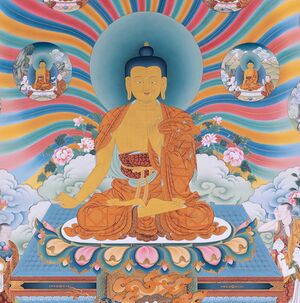Topic of the Week: Who or What is a Buddha?
Who or what is the "buddha" in buddha-nature? The word buddha comes from the Sanskrit verbal root √budh, to wake up and to know. Buddhist texts generally describe the Buddha as the one who is awakened or enlightened. A buddha has woken up from the slumber of ignorance and is in full awareness of the way things are. Tibetan translators used the term sangye (སངས་རྒྱས་, Wyl. sangs rgyas), in which "sangs" refers to being cleansed or freed from something and "rgyas" refers to flourishing. They explained that the Buddha is fully freed from ignorance and other impure things, and the Buddha flourishes with intelligence and wisdom.
The core classic text on buddha-nature, the Ratnagotravibhāga, defines the terms buddha or buddhahood as a state of enlightenment with eight qualities: unconditionality, spontaneity, incomprehensibility, wisdom, compassion, power, benefit to oneself, and benefit to others. Explore what these qualities mean and who or what is the ultimate "buddha" in the context of buddha-nature teachings by reading Root Verse I.5.
Weekly quote
Mind, in essence, is luminous and pure buddha-nature.~ Laṅkāvatārasūtra

